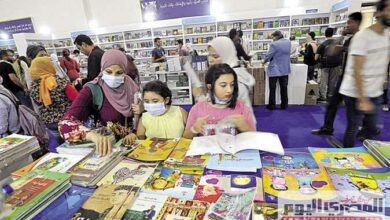As Bahaa Taher flips through a yellowed copy of one of his earlier novels, handed to him by a fan eager for an autograph, a frown crosses the acclaimed author’s face. “This book is missing several chapters,” he mumbles in confusion. “And there are several typos on the last page.”
The star struck smile quickly vanishes from the young fan’s face, and his eyes dart around in embarrassment. “Uhh,” he says.
“Where did you get this?” Taher demands.
The young fan stutters some more, looking on the verge of tears as Taher hands back the book. “If you want, I can buy you a new copy,” the author says.
The young fan offers an awkward apology, and slinks away, clutching his deficient yet autographed copy of “Doha Said” to his chest.
This anecdote is important for two reasons: first, it illustrates the negligence with which literature is treated in Egypt; a disgrace that not even a homegrown literary giant such as Taher can escape.
The second reason is that it was, by far, the most interesting thing to happen at last night’s press conference honoring the author.
Held Thursday evening at the Saad Zaghloul Cultural Center, in a small room doubling as a young woman’s art exhibition—“I’m flattered that you chose to hold this celebration here!” she excitedly told the confused guest of honor–the event was hosted by television personality and published poet Gamal el-Shaer, who thanked the surprisingly meager audience for their attendance, in spite of the violent weather conditions. Also on the panel were literary critics Wael Farouk and Hussein Hamouda.
Despite being a celebration of the accomplished author, the event was instead dominated by the two pompous critics; hogging the podium for an hour each and assaulting the audience with their long-winded pretentiousness. For the first two hours of the conference, Taher barely managed to get a word in, except one occasion in which he politely pointed out to the audience that Farouk’s over-analytical interpretation of one novel did not necessarily coincide with the author’s intentions.
Of course, the events of the evening unfolded to the usual medley of polyphonic phone warbling and stage-whispered side conversations, proving that an audience of 12 “intellectuals” can make just as much noise as a school field trip. Reporters sent to cover the event were roaming back and forth, experimenting freely with the room’s lights for the sake of their photography. Even employees of the cultural center displayed the same tactlessness, disrupting the proceedings with ridiculously loud high-heels and slamming doors.
The evening was rounded–off with a brief Q&A session, during which Taher dutifully responded to the audience’s mostly uninspired questions. One young woman asked the same question—“how do you feel when you’re writing?”—three times, apparently unsatisfied with the author’s answer. In the end she admitted loudly, “I want to feel what you feel!” Another woman claimed she had a question, but instead talked at length about her job as an architect and her love for literature. In the end, she remarked on the deterioration of the Arabic language, to which Taher nodded and replied, “I agree with you 100 percent.”
Minutes later, an elderly Syrian poet got up and made the same exact point (skipping the reference to architecture) to which Taher nodded and replied, “I agree with you 100 percent.”
A older gentleman was interrupted by his own ringing cell-phone—which he unsuccessfully attempted to ignore for several torturous seconds—while asking Taher about the difference between short stories and novels, and how he knows which shape a story idea will ultimately take. “Some ideas are developed enough to construct a novel out of,” explained the author. “Others work better as short stories. Generally, I agree with Gabriel Garcia Marquez, who says that short stories are much more difficult to write than novels, but I also really enjoy writing them. They’re more concentrated.”
A final memorable moment came when one audience member asked Taher his opinion on the necessity of literary agents. After briefly contemplating, the author replied, “I think they play an important role. I believe in them very strongly, but the problem is in this part of the world the vast majority of them are untrustworthy. There are no firm laws to regulate those types of transactions and agreements.”
“Egyptian authors are denied their rights both in Egypt and abroad,” the author claimed.
Finally, the evening reached its end and Taher was presented with a plaque and a bouquet of flowers which he graciously accepted as panel hosts and organizers gathered for a picture, trying their best not to trample the artwork that surrounded them, which included a multitude of shiny pink orbs dangling from the ceiling at head-level.




